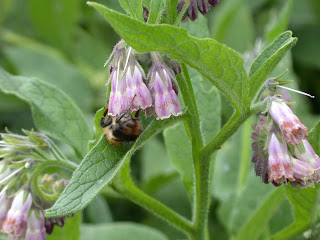Well, what a lovely summer we're having! I have lived in Swansea for twenty years now, and I love it, but never have we had so long without rain. I've been amazed at how the plants have loved it and are flowering their hearts out. We have had precipitation this week and I found it very restful but one day was enough and I'm ready for some more sunshine now, thank you very much.
The fine weather has been ideal for making home tinctures and sitting in my garden one day I reflected as I looked about me that all the medicine we need is growing right in our own back yard.
Within twenty feet of my garden lounger I could see meadowsweet, dandelion, nettle, cleavers, hawthorn, yellow dock, plantain, horsetail, self-heal, sage, marjoram, rosemary, melissa, vervain, comfrey, elder, mints, parsley, rocket, fleabane, butterbur, St John's wort, berberis, willow, artichoke, camomile, fennel, olive - and I could go on! Then there were the fragrances of jasmine, roses, lavender, honeysuckle and sweet peas. I won't list the vegetables and fruit but you get my drift. I thought of all the conditions these plants can heal and wondered why I buy in so much from suppliers from around the world when all the pharmacy I need is right here in my garden.
The most usual method of using herbs, apart from infusions or teas, is from tinctures. Tinctures are preserved in alcohol and, if you get the ratio of plant material to alcohol right, will keep in a stable condition for many years. This makes them very useful for the home herbal medicine cupboard. Making tinctures is easy. The most tricky thing is to recognise your plant correctly. If you are a gardener, you will probably have planted it yourself and can be in no doubt of your quarry. So on a fine sunny morning, after the dew has evaporated, get a basket or cotton bag (not plastic) and some scissors and clip away at the aerial parts of your herb of choice. (Some herbs are better gathered at the root in autumn, such as dandelion but all of those listed above are best collected from their leaves, flowers and fruits). Fill your basket with the foliage and weigh it. To five parts of vodka have one part of herb. Steep the plant in a widenecked jar in the vodka and set it in sunlight (a windowsill will do) for at least 2 weeks, shaking daily. At the end of that time, strain off the plant material and put it on the compost, where it will activate it nicely, and bottle the tincture liquid. Remember to label it with the date of harvest, where you sourced it and your 1:5 ratio of plant to liquid. Keep it dark and cool (an amber glass or PET plastic bottles are best) and it will keep for years. The standard dose is 5 mls 3 times a day, but check with a good herbal book about uses and doses. Or buy my ebooks from Serenity Healing for further infomation and pictures of these beautiful plants. There you will read about folklore, history, methods of use, doses, applications and see good photos for identification purposes.
Empower yourself and your family by growing your own medicines. Always check a reliable book for safety guidelines and be sure you know what you are picking. Many plants in the garden can be reliable friends in times of stress and illness and will cost you no more than a bottle of vodka!
Happy harvesting.
Alexx
Alexx















